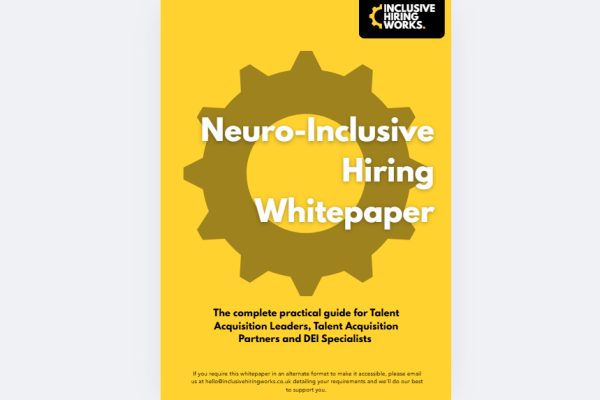10 Practical Tips for Creating an Inclusive Interview Experience
Hiring the best talent isn’t just about skills and experience - it’s about ensuring every candidate has an equitable opportunity to succeed.

Hiring the best talent isn’t just about skills and experience - it’s about ensuring every candidate has an equitable opportunity to succeed. A truly inclusive interview process removes barriers, mitigates bias, and ensures candidates feel valued, respected, and supported.
At Inclusive Hiring Works, we specialise in EDI consulting and inclusive hiring training, helping organisations attract and retain diverse talent by embedding equity, diversity, and inclusion (EDI) best practices into their hiring processes.
Here are 10 practical steps to ensure your interview process is fair, accessible, and inclusive for all candidates.
1. Provide Clear and Accessible Interview Information
Transparency reduces anxiety and ensures all candidates feel prepared. Share detailed information in advance, including:
- The interview format (virtual, in-person, panel, one-on-one)
- The duration of the interview
- The names and roles of interviewers
- Any technical requirements for virtual interviews
Make accessibility a priority: Offer information in alternative formats and invite candidates to request reasonable adjustments to support their needs.
2. Offer Flexible Interview Formats
Traditional interviews don’t suit everyone. Providing flexible options helps accommodate a wide range of candidates, including:
- Neurodivergent candidates who may benefit from a structured environment
- Candidates with disabilities who require specific accommodations
- Caregivers or individuals with long commutes who may find virtual interviews more accessible
Flexibility matters: offering multiple interview formats, such as a mix of virtual and in-person options, along with flexible scheduling, ensures equitable access for all candidates. By removing logistical barriers, organisations can attract a wider talent pool and create a more inclusive hiring process.
3. Train Interviewers on Inclusive Hiring and Bias Awareness
Unconscious bias influences hiring decisions - often unintentionally. Ensure interviewers receive training on:
- Recognising and mitigating bias in decision-making
- Inclusive interview techniques that foster equity
- Active listening to avoid making assumptions
- Structured questioning to maintain consistency
Well-trained interviewers = fairer hiring decisions. Investing in inclusive hiring training leads to better talent acquisition outcomes.
4. Consider Providing Interview Questions in Advance
Structured preparation can improve performance, particularly for neurodivergent candidates who may need extra processing time.
Did you know? Research shows 43% of neurodivergent candidates struggle with traditional interviews due to unexpected questions and rapid responses.
Providing interview questions in advance allows candidates to focus on showcasing their skills and experience, rather than managing anxiety.
5. Use Structured Interviews to Ensure Fairness
Unstructured interviews leave room for bias and subjectivity. Instead, structured interviews ensure every candidate is:
- Asked the same job-related questions in a consistent order
- Assessed against clear, predefined criteria
- Evaluated on their responses - not assumptions
Data-backed hiring: Structured interviews are proven to increase fairness, reduce bias, and improve hiring accuracy.
6. Rethink Non-Verbal Communication Expectations
Not all candidates communicate in the same way. Avoid making hiring decisions based on:
- Eye contact – Some neurodivergent candidates may avoid direct eye contact.
- Handshake firmness – Not all candidates can or will shake hands.
- Body language – Cultural and individual differences influence non-verbal behaviour.
Instead, focus on what matters: the content of a candidate’s responses and how their skills align with the role.
7. Create an Inclusive and Welcoming Interview Environment
First impressions matter - for candidates too. Ensure your interview space is:
- Physically accessible (step-free access, quiet spaces if needed)
- Sensory-friendly (noise levels, lighting, seating considerations)
- Technically inclusive (captioning available for virtual interviews, screen reader compatibility)
Ask candidates in advance if they require any adjustments to participate fully.
8. Ask Strengths-Based and Open-Ended Questions
Not all candidates follow traditional career paths. Instead of focusing solely on past experience, use:
- Strengths-based questions to highlight capabilities and potential
- Open-ended questions to allow candidates to demonstrate transferable skills
This approach ensures candidates from non-traditional or underrepresented backgrounds get a fair opportunity to showcase their abilities.
9. Allow Sufficient Time for Responses
Some candidates - particularly neurodivergent individuals - may need extra time to process questions and formulate responses.
- Don’t rush or interrupt responses.
- Provide a buffer between interviews in case extra time is needed.
Inclusive hiring means giving every candidate the time and space to succeed.
10. Provide Constructive Feedback to Candidates
Inclusive hiring doesn’t end with selection. Offering thoughtful, actionable feedback to unsuccessful candidates:
- Supports career development
- Strengthens your employer brand
- Demonstrates commitment to fairness
A feedback-rich hiring process fosters engagement, transparency, and long-term inclusivity.
Building a Truly Inclusive Hiring Process
Implementing these inclusive interview practices can help remove barriers, attract diverse talent, and build a workforce that thrives.
At Inclusive Hiring Works, we provide:
- Inclusive Hiring Health Checks – Comprehensive audits of hiring processes
- Workshops & Training for Talent Acquisition Teams – Practical skills to drive inclusivity
- Inclusive Hiring Training for Hiring Managers – Ensuring equitable hiring decisions
Want to make inclusive hiring the norm in your organisation? Read more about our services.
Book your Free Discovery Call to learn how we can support your business!
Share this post:
Related Posts

Is your hiring process neuroinclusive? Find out how to make it fairer, smarter and legally safer.

As UK organisations increasingly adopt AI tools for recruitment, from CV screening to interview anal...

We all want to believe we’re making fair and objective decisions. But unconscious bias has a way of...


